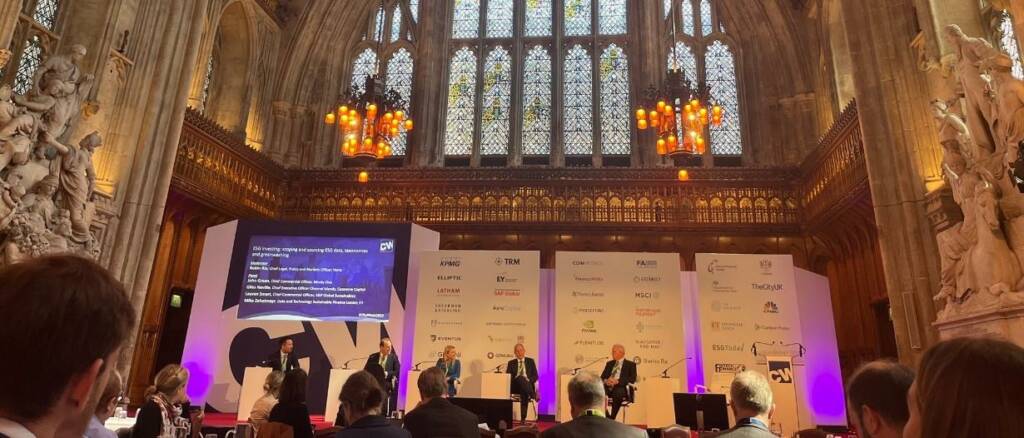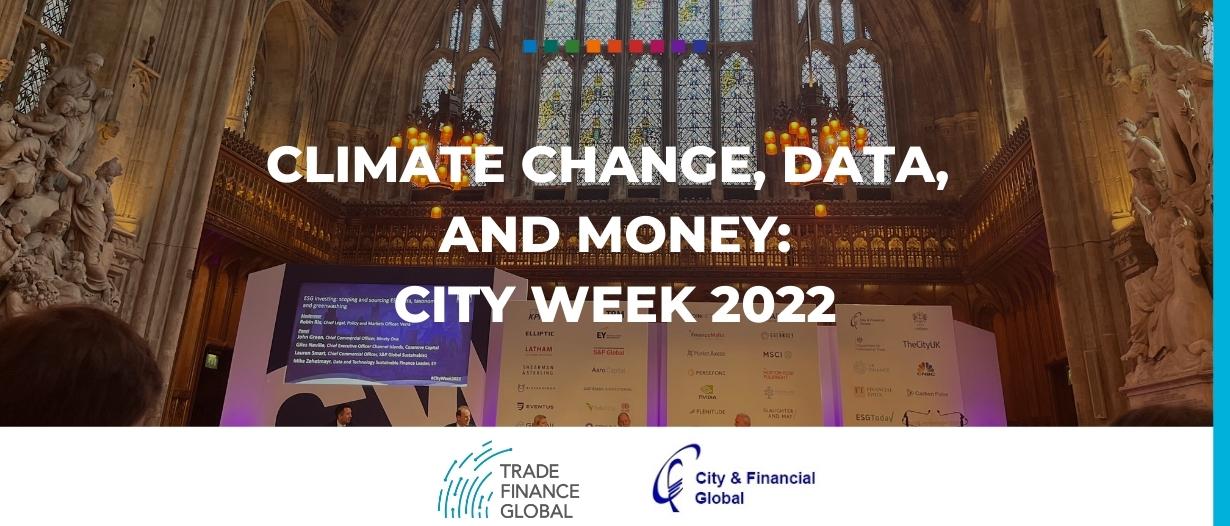This week, City Week 2022 was hosted in London at the Guildhall building.
Trade Finance Global are delighted to have been media partners for the event.
Day one, themed “Meeting the climate change challenge – the role of financial services in achieving net-zero”, was packed with speakers and panel discussions.
Here is a quick rundown of the main themes covered throughout the first of this three-day conference.

Climate change is real
Scientists indicate that we have 8 years to stop rising global temperatures before the average temperature increases two degrees above current levels.
Once the 2-degree threshold is reached, further temperature increases will be beyond human control.
This is because natural carbon sinks, such as ice caps, will begin to deteriorate at this higher level, releasing ever more carbon and further increasing temperatures into a feedback loop.
Once the global average temperature reaches a 3-degree increase, experts predict that 75% of the global population will not be able to live where they do today.
This is a bleak forecast that necessitates unprecedented human migration, particularly for people in coastal regions.
Despite this outlook, one common trend from day one at City Week is not to lose hope!
Rather, industry leaders and policymakers need to take action and double down on climate finance efforts to provide the liquidity that will help steer humanity towards a more sustainable destination.
Let’s dive in and look at some of the key trends that emerged during the climate-change-themed day of the conference.
Data and Information drive change
Data and information related to climate change are critical drivers for change.
According to the day’s speakers, the majority of companies either do not collect climate-related data or don’t have any meaningful plan for acting on it.
Those that do collect it and have a plan to act on it, are simply too early in the process to have any realistic insights at this point.
To change this and help provide access to data, some government entities are implementing reporting requirements for the private sector.
These requirements do not force firms to act in a certain way, but rather regulate the transparency of data – ensuring that it becomes available for the public and investors to review.
This will be a critical step in allowing the market to analyse and subsequently make informed climate-related decisions.

Emerging economies require a different approach
Another critical aspect of data to bear in mind is the vast disparity that exists between the quality and quantity of data available in developed and developing countries.
Data indicates that 50% of the current carbon emissions hail from emerging economies and that these nations are poised to contribute to 90% of the emission growth in the years ahead.
While these figures may suggest that efforts should be concentrated on emerging economies, this is not such a simple solution.
In these markets, simply transitioning away from dirty energy sources is not an option.
The lights would turn off and millions would be out of work.
Instead, global organisations need to encourage developing economies and the firms therein to gradually transition to more sustainable options.
This will take time and these global leaders will need to take responsibility for bringing emerging economies along and lay the groundwork for them to transition in the future when the time is right.
The importance of education
Another theme that recurred on day one of the 12th City Week conference is the importance of education.
Many firms and key stakeholders lack the necessary knowledge of climate and related metrics to even know what is important, let alone make informed decisions.
Increasing this education will create familiarity with the topics at hand and drive a sense of urgency among everyone involved.
Firms need to educate everyone across their business and broader supply chains.
With the refined sense of knowledge that education and training will provide, key industry leaders will be embodied with a sense of trust in the options that are available.
Increased trust will help facilitate investments in green solutions since financiers will know what the services do and why they are important for the planet.

Money moves the needle
Taking action to fight climate change requires significant capital investment – investments that will largely have to come with the help of financial institutions.
Like all other individuals and organisations with an interest in keeping planet earth livable, financers need to ensure that they are educated on climate matters.
This will help allocate funds to the right hands to drive real change in the ecosystem.
From a macro perspective, there are debates as to which financial approach is superior: carbon taxes or carbon markets.
According to the experts at City Week, these debates are largely insignificant since both of these tools are necessary to reach the levels of change that the earth requires to survive.
When it comes to creating financial models, firms must begin to account for the added costs of carbon.
Many policymakers predict that within the next decade, such financial allocations will be necessary for a company’s financial statements.
This means that any longer-term financial model that does currently account for these, is not going to be accurate.
Taking action
Perhaps the most imperative takeaway from the first day of City Week 2022 is the importance to take action now.
Yes, many of the solutions that exist today are not perfect – but that’s okay.
Perfection cannot be the enemy of the good – if we wait for the perfect solution to exist before we take action, it will be too late.
Collaboration is also critical – Individual firms cannot reach the necessary levels of change on their own; they must come together to tackle the issues together.
This goes beyond just the private sector to include firms joining together with public sector institutions to collaborate to help enact real change.
 Australia
Australia Hong Kong
Hong Kong Japan
Japan Singapore
Singapore United Arab Emirates
United Arab Emirates United States
United States France
France Germany
Germany Ireland
Ireland Netherlands
Netherlands United Kingdom
United Kingdom










Comments are closed.